
來自太巴塱部落的阿美族人,2009 年到荷蘭萊頓大學從事十七世紀台灣史研究,之後定居荷蘭。目前以翻譯、寫作、研究為主業,並參與國際原住民族運動。曾獲 2017 年台灣文學獎原住民短篇小說獎。已出版小說有《絕島之咒》,翻譯專書有《地球寫了四十億年的日記》、《西班牙人的台灣體驗》、《故道》等。
Pandora's Archives No. 4|An island with the theme of colonial history (Let Love Power Season 2)
Before, we introduced the fundamental logic of the archives world ( Part 1, Part 2), explained the functions and tasks of the National Archives ( trust, question, archives ), and also discussed the process of the Dutch National Archives reflecting on the history of slavery in the Netherlands. The role it plays ( archives and a sinful history ), today we are going to continue the topic of the last time, talk about the impact of the Dutch National Archives on the construction of early Taiwan history, and whether the history written with colonial archives can get rid of colonialism Color has even become a cornerstone or tool for decolonization. Because the topics are broad and complex, and it is not easy to integrate them under a single structure, we decided to start today's topic around specific books, so that readers can have specific clues to grasp. If interested, they can also use these books as early Taiwan history. getting Started.
The main content of this time is <br class="smart">Introduction: From the novel "Musui" of Aunt Shui She's curse on Dutch officers, talking about Deng Jinhua's "Imagine Taiwan": Where is the colonial boundary?
The publication and translation of the Dutch East India Company's Diary of Geranja: The Value of Colonial Historical Materials The historical novel "Farewell to Formosa" by Dutch-born author Berjos: historical materials can be the nourishment of literature Formosa Sightings and Formosa Supplements: A Non-Historian's Desire Addendum: A Historical Narrative Written Purely from Colonial Sources
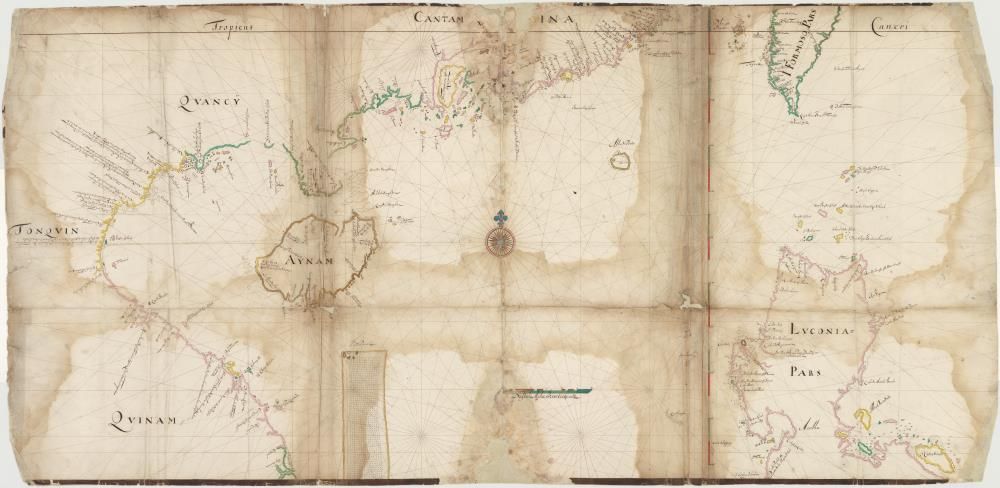
Introduction: From the novel "Musui" by Aunt Shuishe's curse on Dutch officers
Can you read Taiwanese? If possible, you may wish to read Voyu Taokara Lâu's short story " Musui ", an assistant professor of the Department of Language and Literature at Taiwan Normal University, which was included in his first collection of short stories, " Inverted ". This story is based on the historical material "The Diary of the City of Geranza" left by the Dutch, which tells the tragedy of Pieter Boon, a Dutch soldier stationed in Formosa in the mid-17th century. As a colonizer and aggressor, he watched the aunt of the Water Society (Sun Moon Lake) being burned at the stake. The gaze and the tragic curse before his death were the deepest shadows in his heart, and he finally fulfilled that curse. The material for this novel may not seem unusual today, but when I read the first draft of the story fifteen or sixteen years ago, it was an untouched subject matter.
It is never accidental that a piece of historical material or a historical event becomes the writer's story material. Usually, there is considerable background work in other parts of the society before the writer starts to write. This "place" is often the world of history. Indeed, before Liu Chengxian wrote "Mu Sui", the early research on Taiwan history had already achieved preliminary results-Jiang Shusheng's translation of "Relan Zhecheng Diary" had been published, and scholars such as Weng Jiayin and Kang Peide who specialized in Taiwan history during the Dutch period also All returned to China after completing their studies and began to publish papers. In the past, it seemed that the only way to care about Taiwan's local culture was to turn to the Japanese era. However, with the introduction of Dutch historical materials to Taiwan, Taiwanese who were trying to get rid of the impression of Greater China had a different direction and sustenance.
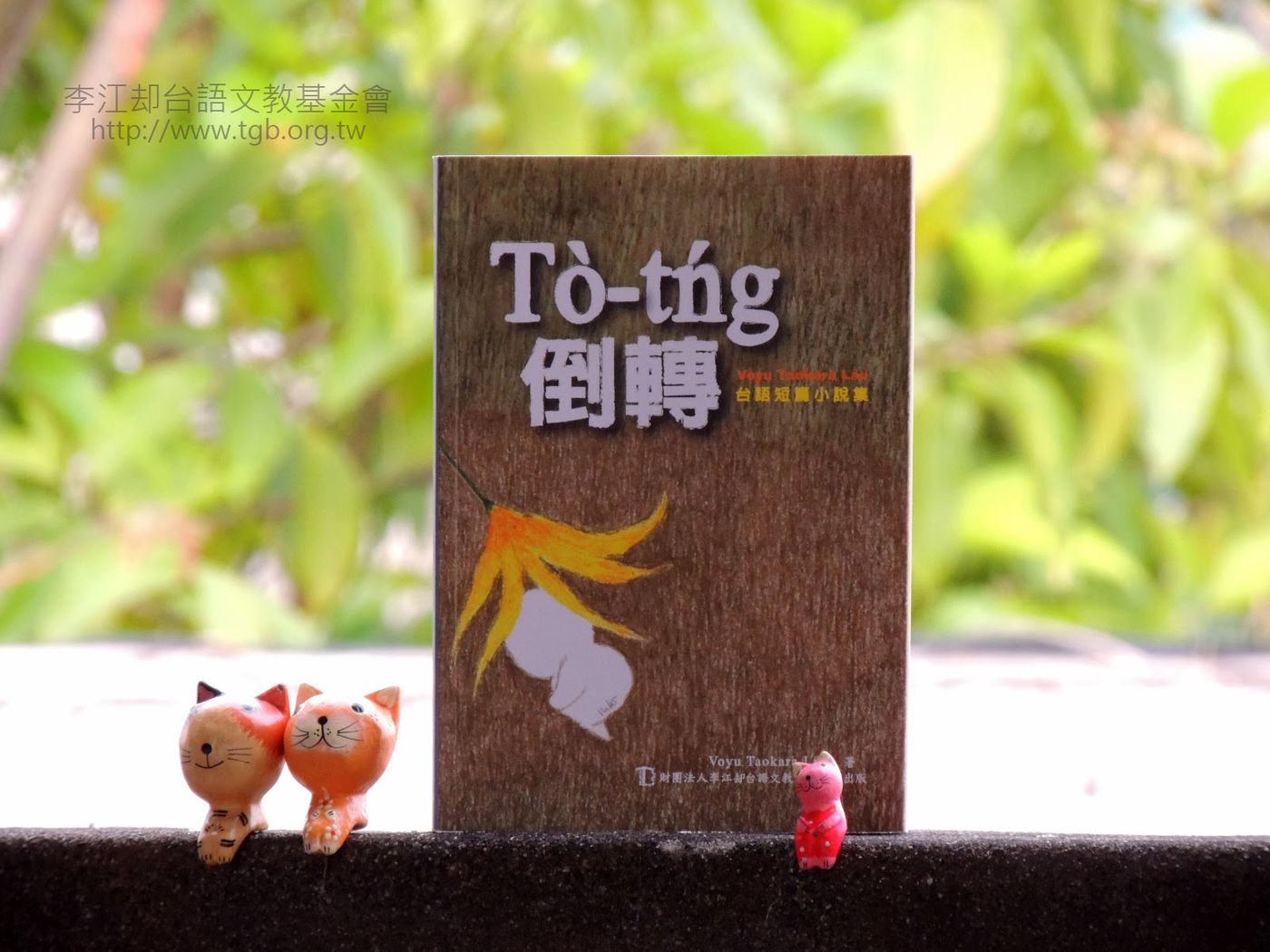
Over the past two decades, more and more people have devoted themselves to the study of Dutch Taiwan, and the publication of academic and non-academic related works has also become more and more vigorous. The basis is the Dutch East India Company archives of the Dutch National Archives. If it is said that 20 or 30 years ago, excavating historical materials in The Hague gave people a "sense of entrepreneurship" full of hope and longing, and continuing the same work today, it will inevitably raise doubts in my heart. If it can be said that when Taiwan historians turned to an earlier colonial era, at least part of it was to break free from the myth of "Greater China" and embark on the road of exploration and self-establishment, then is there also a sense of self-identification in another colonial era? The problem? That's the subject of our interview today.
㊟ The so-called " early Taiwan history " does not have a strict definition. It is usually used to refer to the history before the Qing Empire incorporated Taiwan into its territory in 1684 , including the Dutch and Spanish who divided the north and south of Taiwan and the expulsion of the Dutch. Zheng family. In the understanding of many Taiwanese, the Netherlands and Spain in the seventeenth century, and Japan, which ruled Taiwan for fifty years since the end of the nineteenth century, were colonial regimes. rather than being considered a colonial regime, this view has been gradually challenged in recent years.
Interviewee: Dhr. prof. dr. KJPFM(Charles) Jeurgens
Present|Strategic Consultant of the National Archives of the Netherlands, Professor of Archives at the University of Amsterdam Formerly served as Professor of Archives at the University of Leiden; Acting National Archivist of the Netherlands; Director of the Selection and Identification Department of the National Archives; Director of the Research Department of the National Archives
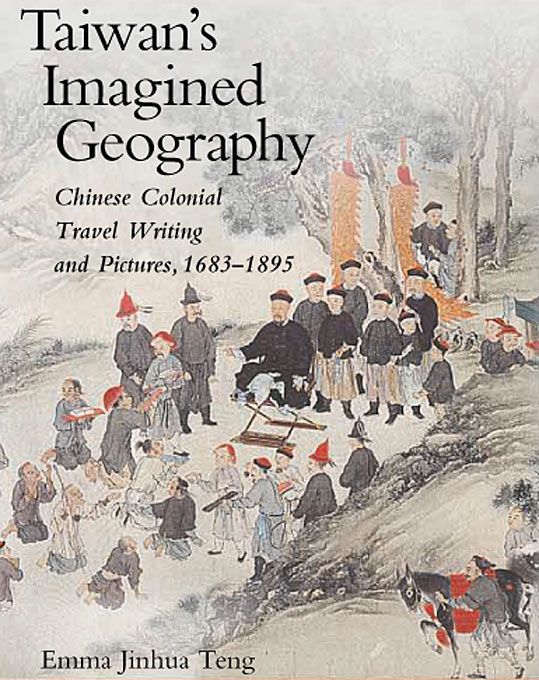
In Taiwan history circles, Deng Jinhua's "Imagining Taiwan: Writings and Images of Chinese Colonial Tourism " is generally regarded as an important work to break the myth that "the Chinese regime is not a colonial regime". She points out in the book that unless Taiwanese rethink what "colonization" means, they will not be able to embark on the road to decolonization. You also have this book on your shelf. Can you share your thoughts on Imagine Taiwan?
Yan Lingshi: Frankly speaking, before I met you Taiwanese students, I had no idea that the education in Taiwan did not treat Zheng Chenggong and the Qing Empire as colonial regimes (I am unfamiliar with this logic). After communicating with Taiwanese students, I found that Taiwan is very suitable for decolonization researchers to discuss. It is really difficult to find a place in the world that is as bad as Taiwan.
From this perspective, I think Deng Jinhua's "Imagine Taiwan" is really an important treatise. She uses many interesting historical materials to let readers understand how Taiwan was understood and imagined by the Qing Empire, and how these understandings and imaginations changed with the expansion of the empire. In other words, she explained in a vivid way that " Taiwan is a colony of the Qing Dynasty ."
I think the significance of "Imagining Taiwan" lies not only in academic research, but as long as it is disseminated and popularized, it should be able to trigger extensive discussions among citizens. I want to reiterate what I said last time I talked about the history of slavery - social consensus is the most important thing, no matter what kind of social engineering, it can't be stable without social consensus as a foundation. So I look forward to seeing Taiwanese thinking about colonialism and imperialism on the basis of Deng Jinhua's research, especially realizing the existence of "Chinese imperialism". What is special about Taiwan is that Taiwan has experienced imperialism in Western Europe as well as imperialism in East Asia (both China and Japan). Logically, such experience should make Taiwan a treasure and a vanguard of the global decolonization movement.
Why do you think Taiwan did not become the vanguard of the decolonization movement?
Yan Lingshi: Although it will offend people, I have to say that in the past two or three decades, Taiwan has worked hard to transform from an authoritarian state to a true democratic state. In addition to facing the threat of China, in order to refute the "since ancient times" relationship between Taiwan and China, he did not hesitate to cite earlier colonial historical materials to demonstrate the diversity of Taiwan's history. As an archivist and an archivist, of course I am happy to see the Dutch East India Company historical materials in the National Archives in The Hague being used, but it is not wise to embrace the early colonizers to refute the later colonizers, whether in terms of academics, knowledge policies, and educational policies. practice.
My former colleague, Professor Paul Le-Shi , has trained some important Taiwanese history talents for Taiwan, but I'm afraid they all share Paul Le-Shi's "new colonial view of history" - I don't mean that Le-Shi Leh is colonialism only to say that their historical perspectives have not completely escaped the shadow of colonial thinking. Bao Leshi believes that compiling the historical materials of the Dutch East India Company so that Taiwanese can understand many things that happened in Taiwan in the seventeenth century is to " give history back to Taiwanese ", and many Taiwanese are very happy that history "has been lost and found again." But as we said last time we talked about slaves, these archival studies can easily inadvertently constitute a new kind of colonization.
I cite Indonesia as an example where I am deeply involved. For the past ten years, I have been invited to the National Archives in Jakarta to teach classes every year, and the Jakarta Archives also sends archivists to the Department of History of Leiden University for training almost every year. The training of such knowledge and skills is actually the training of world outlook and values. The better an Indonesian archivist is trained, the more he will be influenced by the values of his former colonial home country (the Netherlands), and the more he will spread Dutch values, consciously or unconsciously, by returning to Jakarta. I can't say it's definitely a bad thing, but not being aware of it should be a bad thing. In today's Indonesia, Suriname, and Taiwan, many believe that there is no history outside the Dutch colonial archives.
Of course, the definition of history is " written in words ", so without historical data, there is no history. Without the Dutch colonial archives, the current early Taiwan history would not have been written at all (may have to rely more on Chinese historical data). It sounds right, but it doesn't stand up to scrutiny at all. Like slaves, isn't there a past outside of the slave owner's literature? Of course not. So I'm actually somewhat disturbed by Taiwan's excessive construction of history writing on European colonial historical materials. Of course, I believe in the wisdom of Taiwanese people, and they should have a clearer self-awareness over time. If it doesn't, it will be troublesome , because this is really not a topic for foreigners like me to chime in, even if we are criticizing the historical data we provide.
⇩ The engraving depicts the defeat of the Dutch on July 5, 1661, when the Dutch surrendered the city of Geranza. Unknown author, dated circa 1661-1700.
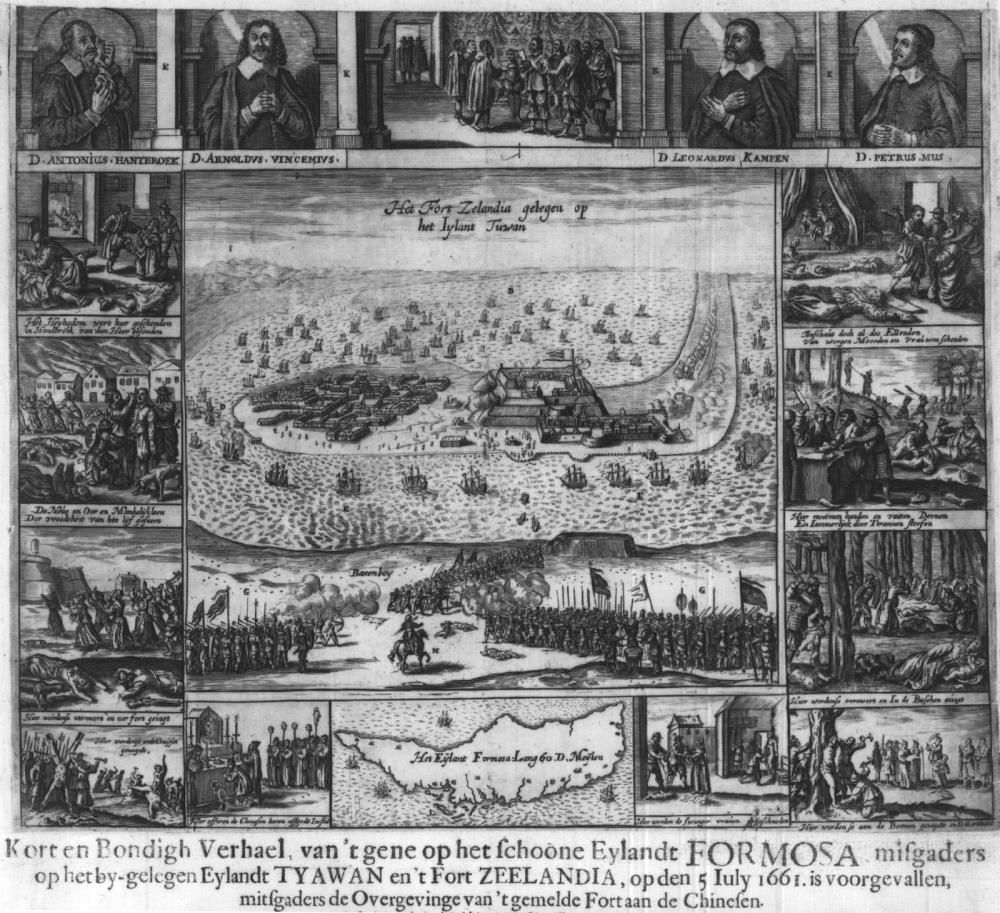
The study of Taiwan history in the past two decades can hardly be separated from the "Relanja City Diary" of the Dutch East India Company's business hall. What do you think of the importance of such historical materials?
Yan Plover: The Dutch East India Company's business halls in various places will make such diaries. Because they are recorded daily, they are of course historical materials worthy of reference for historians. If the purpose of today's researchers is to clarify some of the activities of the Dutch in Taiwan, then it is absolutely unreasonable to omit "The Diary of Relanza City". For readers in the Chinese-speaking world, the "Records" of the emperors of the past dynasties should be a very appropriate analogy. We all know that China's tradition is that officials revise history, and of course it must represent the official position of the empire. Considering the authority of the Chinese emperor, I think there must be many unreliable records of the emperors, but this does not affect the importance of the record. Used by historians by reference to historical sources.
However, Taiwanese used Dutch historical materials (or historical materials from Spanish, French, British and other European countries) to construct early Taiwan history, and Chinese historians used the record as an important reference historical material. Among them - at least in my superficial understanding - there are One difference is that we are all wary of official Chinese history, but generally speaking, Taiwanese historians are not wary of European history.
It's hard for me to pinpoint which line of which book shows such negligence, or even naivety, but today's early Taiwan historians are all well-trained and, of course, think about Taiwan in a Western European way. history. Isn't that all our mutual friends in this field? I don't mean that any of them are not academically rigorous, on the contrary, they are all excellent scholars, but the problem is that they are such excellent scholars, because they rely heavily on colonial historical materials, which is equivalent to taking their own history. Construction constitutes colonial history.
⇩ The picture shows the Kangxi Dynasty Record Volume 115, from April to June of the 23rd year of Kangxi. April 23 of the year of Kangxi was the time when the question of whether to stay in Taiwan , which had been debated for a long time in the imperial court, was finalized.
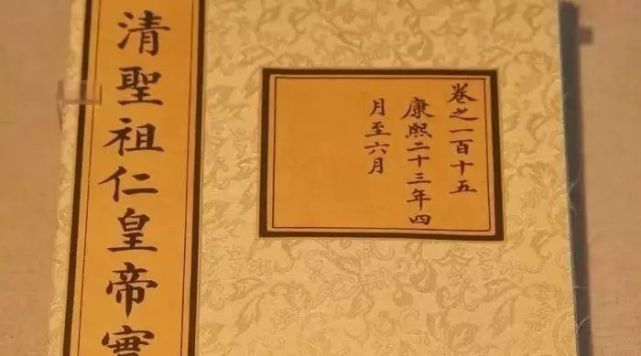
But without historical materials, there is no history, so what should people who are engaged in Taiwan history research do?
Yan Plover: I am not very suitable to express too many specific opinions on this issue, because after all, I am a citizen of the country that once colonized Taiwan. But just like the history of slavery discussed earlier, the past of slavery cannot only be understood from the documents of slave owners. The common memory, oral traditions and other forms of expression of the black community should be valued by researchers and the general public. The same is true of Taiwan history. For example, the publication of the aforementioned "Encounters with Formosa" compilation of historical materials has provided historians with easy access to seventeenth-century Dutch and Aboriginal interactions, but if the historical materials are regarded as more reliable evidence of the past , that's really too bad too bad.
I would like to illustrate further with the example of my visit to your Amis Mataan tribe.
I've heard you say before I got to Matthew Saddle that the East India Company documents clearly stated that they set fire to Matthew Saddle out of revenge, but I didn't know you mentioned this to your tribe as well historical data. As a result, as soon as I arrived at Mata, everyone warmly entertained me, gave me sashimi and salted pork, and said to me, "I heard that you Dutch people burned Mata." Everyone also told me , This matter sounds serious, but there are no oral stories left. If the current Matthews were not informed of the Dutch historical records, they would not have known that the Dutch had been there. This, in the eyes of some of my colleagues, represents the importance of Dutch historical material (if it hadn't been recorded by the Dutch, it would have been completely forgotten, so to speak), but I think I heard it from your Matthews at the time The explanation convinces me even more. They said that since there were no oral stories left, it meant that "the burning of the tribe was not a big deal in the eyes of the Matthews at the time." Only now did I understand more that the aboriginal world of course has its own logic, and there are many things that we Western Europeans really shouldn’t use our own imaginations to replace reality.
Therefore, history is a building built with written records as bricks and tiles. This is traditionally true, but since we have entered an era of high cultural exchange and rapid information flow, we have to change in practice. Historical data may provide some details, but can we allow information other than historical data to become the material for constructing history? Furthermore, do we have enough minds to accept a broader concept of "history"?
Let me ask a little more about the Matthew example: if you accept our people's explanation that what is not handed down means it is not important in this group, then why do we need to know anything other than what we already know What's the matter? Is that not important to us anyway?
Yan Plover: Logically, this is true, but like I just said, this is an era of cultural exchange, and we don’t think that culture and knowledge systems must be mutually exclusive. Perhaps for the Mataian people at that time, it was not a big deal for the tribe to be burned down, and it would be good to rebuild it. There is no need to make a special song about this matter and pass it on to the descendants, but now the Mataian people know that it is not harmful. He can decide for himself how to react. Frankly speaking, my impression of you Mataian people is that they heard such an anecdote and thought it was very fresh, and would use it as a topic of small talk, but just like their ancestors, they didn't take it to heart. Maybe in the end this matter is still circulated in books in the form of "the history of the Dutch in Taiwan", rather than appearing in tribal oral traditions. This further confirms the view of " whose historical material, whose history ". The archives of the East India Company were left by the Dutch, and the history written with the East India Company archives is the colonial history of the Netherlands. Whether the author is Dutch or not is not the point.
Back to the influence of the National Archives in The Hague on early Taiwan history.
Yan Plover: From an archivist, archivist or historian point of view, of course I would love to see historical materials used, but we have to be careful about colonial historical materials being used to the point of getting too much volume . Now the Taiwan-related historical materials in the National Archives in The Hague have been sorted out at the most basic level, so Taiwanese scholars have begun to turn to the Indonesian National Archives in Jakarta. The archives in Jakarta should indeed have the largest collection of Dutch East India Company Taiwan-related materials, after all, most of the documents sent from the officers to Batavia (Jakarta) will not be sent further to the board of directors in Amsterdam. Then, the Taiwan-related historical materials of the National Archives in Jakarta will also have the application of colonial historical materials.
But I am really curious to see how far the study of "early Taiwan history" based on Dutch colonial history will progress. I know that Mr. Wei Desheng, the director of "Seediq Bale", has obtained a lot of information and ideas from Professor Bao Leshi, and I heard that he is going to make "Taiwan Trilogy". Based on what I saw in "Seediq Bale", I believe that Director Wei will be able to make a good movie. This "Taiwan Trilogy" will definitely have a positive impact on Taiwan, but it will also have a negative impact. Impact. However, I am optimistic that as long as we have a clear awareness of the existence of negative effects, the magnitude of this effect will be reduced.
What negative effects will there be? Of course, colonial perspectives were more efficiently communicated through powerful visual media. But then again, "colonized" and "voluntary or forced acceptance of colonial views" are also part of Taiwan. Without such views and opinions, it seems impossible to justify.
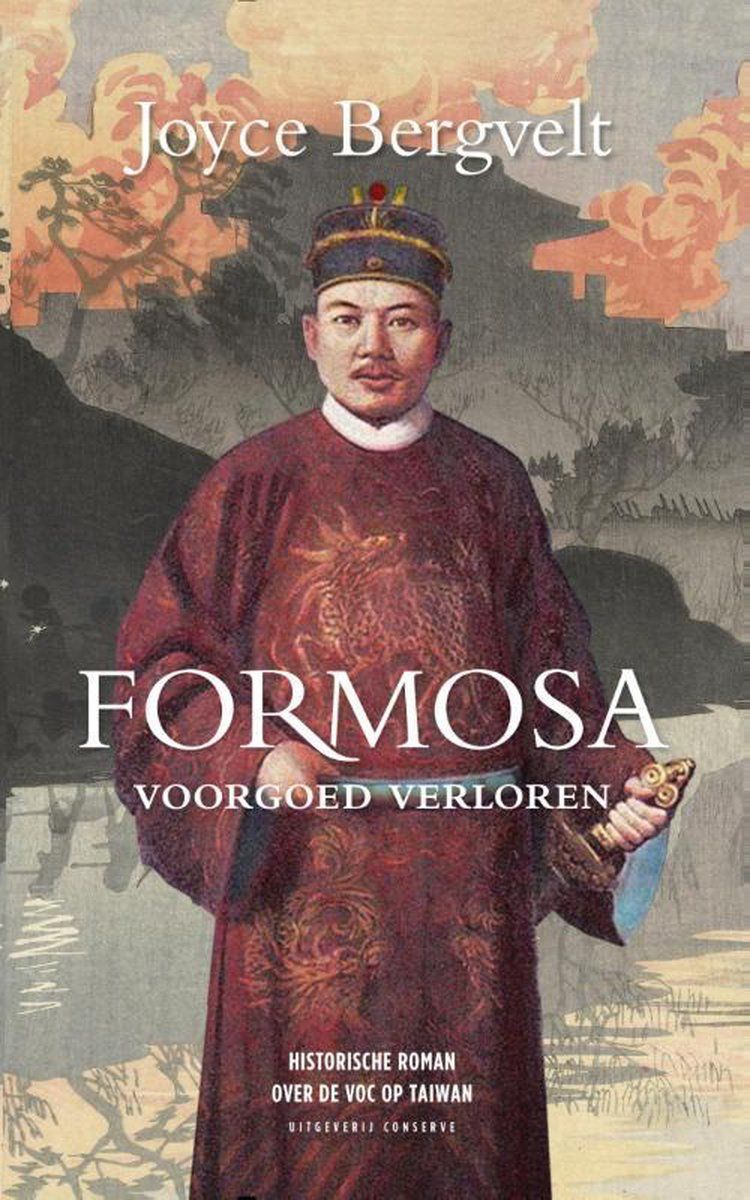
Now that we talk about the application of historical materials, can you talk about the historical novel "A Farewell to Formosa " by the Dutch-born author Bejos?
Yan Lingshi: I know this novel, but to be honest, I really haven't read it. Bejos's novel describes the story of Zheng Chenggong's attack on Taiwan, and the high-ranking officer Kui Yi retreating to defend the city of Relan. This is very new to Dutch readers, because ordinary Dutch people do not know the past of the Netherlands and Taiwan, and the novel is based on historical materials. It is said that the description is vivid and well received.
Bejos's original novel is English, called " The Lord of Formosa ", when translated into Dutch, the title was changed to "forever lost" (voorgoed verloren) Formosa, as we are familiar with this history Those of you can immediately recognize that this is a copy of 't Verwaerloos de Formosa ' written by himself after the defeat, and we are all familiar with those historical materials. Of course, I didn't read novels when I had more free time. But this should be my fault for my poor time management. In fact, this novel has a good reputation. For people who are not familiar with this history and are interested, if they can read English or Dutch, I still recommend it. After all, literary works can be read. Readability is always higher than academic papers.
⇩ The picture shows the cover of "The Forgotten Formosa" by Kui Yi. The Utrecht University Library in the Netherlands has a high-resolution scanned archive of the entire book available for free browsing. Regarding this book, Professor Bao Xiaoou 's " Spanish in Taiwan " is the most concise and expressive description: "In the end, Batavia let Kui Yi take responsibility for the loss of Fukushima alone... He was imprisoned in Batavia for three years. , was sent to an island near Banda for life imprisonment. In 1674, Kui Yi was pardoned at his son's request and negotiated with the Prince of Orange, and later wrote the magnificent Baroque era "The Delayed Fukushima", proposing his own He blamed Vyborg for his "deep hatred for Kui Yi", also blamed Lan Zhen for his "greedy greed in the Battle of Magang", and finally he blamed Gayawu for "lack of faith" for taking the ship with him Cowardly fleeing with his men during a siege, leaving those trapped behind to face their own destiny. "Fukushima," is a milestone, telling the story that the glory days are gone, and the glory is worthless now."

Can you talk about the kind of historical data collection project launched by our mutual friend, Lan Bai, the author of " Leaves in the Wind: A History of Formosa " and " Formosa Supplements: The First Experience of Taiwan in Europe and America"?
Yan Plover: Lan Bai went to Taiwan to do research during the martial law era in Taiwan, and accidentally discovered that Taiwan had had various exchanges with the rest of the world so long ago. Since then, he has been obsessed with collecting Taiwan-related historical materials from all over the world, hoping that through his own work, It can make Taiwanese people wake up to the diversity of Taiwanese history. It can be said that it shares Baoleshi's belief in "returning history to Taiwanese", although the two of them are very different, and they are completely different. Over the years, he has published two books, and now also provides Taiwanese history-related manuscripts for Taiwan's "Classic Magazine", and there should be more tomes published in the future. Of course I admire his perseverance and hard work, although I don't necessarily agree with the view of "returning history to Taiwanese".
To be fair, I think it's enough that any effort by anyone can always help someone or someone at some point. It is not only things that affect millions of people that are worth doing. Let's just say that Lan Bai is now giving "Classic Magazine" a piece of Taiwan history related articles. Maybe his article inspired someone by accident... Just like director Wei Desheng, I heard about his "Sedek Bale" movie. Inspired by comics? Even if it doesn't inspire anyone, it just provides entertainment for everyone to read and expands their horizons, which is still valuable. So of course I'm still happy to see it, and I hope his Taiwan publishing project will be successful.
⇩ The picture shows the news photo of the Kaohsiung press conference of Lan Bai's new book, "Formosa Supplements: First Experience in Taiwan in Europe and America" in October 2019 in the Taiwan Church Gazette .
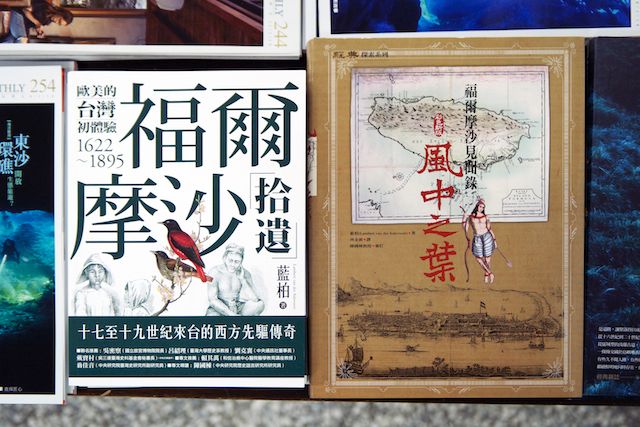
As a historian and archivist, I hope to see the Dutch archives being used by Taiwanese people, no matter what kind of application it is, but also because I am a historian and an archivist, I would like to remind readers in the Chinese-speaking world, especially Taiwanese readers , don't forget the first lesson of archival science - any document has its original context and purpose. Basically, we can understand this original context as an established bias , so we do not use archival documents without questioning criticism . Also, for those who want to do archival research, I would say: We can think that knowledge itself has value, so the results of archival research don't have to be beneficial, but this is an era of extremely resource-crowding effects, and beneficial archives Research is usually easier to obtain resources and support than the pursuit of pure knowledge, and we archivists always hope that the scraps of paper in the archives will eventually be transformed into meaningful social tools through the condensed chain of knowledge, benefiting more people in real life.
Appendix: A historical narrative written purely from colonial sources
Ten years ago, when I was doing research at Leiden University, I wrote a dissertation on the archives of the Dutch East India Company, which contained a historical narrative. At that time, I wanted to test whether "historical narratives written purely with colonial historical materials" could break away from the framework of colonial history, and the result of the experiment was: no . Yan Plover also read this narrative back then, and he suggested that I share this narrative, so that everyone can confirm through their own reading experience whether the history written with colonial historical materials can get rid of the color and limitations of colonial history.
This narrative has more than 7,000 words after being translated into Chinese. I published it on Matters as an independent article "A Narrative Written Purely from Colonial Historical Materials: Losing the Gold Never Gained ". Friends can link to this article to read the full narrative. (Please note: this narrative is rigorous history, with no fictional elements, and the citations at the time were almost as long as the text.)
In the spring of 1646, Nope, a junior trader of the Danshui <br class="smart">Dutch East India Company, had been ill for quite some time, and perhaps he should not have come to Danshui at all. Since I came to North Formosa to take over the duties of freshwater and chicken coops in August last year, my illness has not been interrupted. Kaiser, who was in charge of matters here before him, was also a junior businessman. He passed away six days after his illness. At this moment, Nope could only hope that he would not follow in his footsteps. A year before this, many Dutch people fell ill at the turn of the seasons, and the chief officer Caron heard about the tragic situation of the fresh water and the chicken coop, and immediately sent two doctors north with the necessary medicines. The chief is particularly concerned about the condition of the veteran businessman Steen. Steen arrived in Tamsui only a few days later than Nope, and made a special trip to supervise the local council to be held in Tamsui. But before the officer could take any action, Steen died the next day. But it will not be until half a month later that the chief will read the sad news in a paper document. And Nope, who wrote the letter, was also bedridden.
If interested, click here to read the full story.
about future articles
Above, the first four of the "Pandora's Archives" writing proposals have been completed. If anyone proposes an archive topic that they want to discuss, we will be happy to give priority to it. If no one "orders a song", the next one will be scheduled The theme is the Louvre Museum, which once served as a Dutch political prison in the seventeenth century. This medieval castle on an isolated river once held a famous figure in European history, whose influence has not stopped since the seventeenth century and has a wide range of influences around the world. Many historical materials about this person are kept in the National Archives of the Netherlands, so after we leave the National Archives, we might as well take the Louvre Castle as our next stop to talk about the archives.
Like my work?
Don't forget to support or like, so I know you are with me..
Comment…